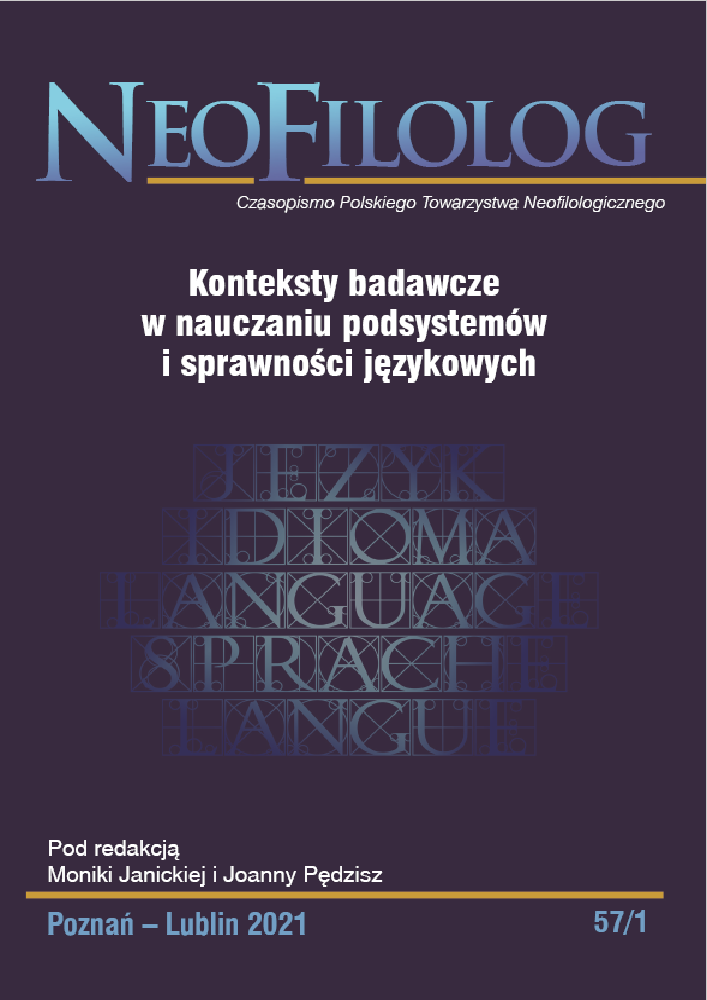Résumé
The paper presents the results of a survey conducted in the academic year 2018/2019 among students of Italian Studies at the University of Wroclaw on metacognitive self-consciousness concerning Italian writing proficiency. The questions concerned the students' practice of written forms of expression in their private lives; the contribution (actual or anticipated) of writing proficiency in their current and future professional career; and the evaluation of the teaching of writing proficiency within the university curriculum of Italian Studies. The study was qualitative and conducted from an emic perspective, involving students in metacognitive reflection. The results of the study indicate limited metacognitive self-consciousness on the part of the students of Italian Studies, who are not, however, devoid of any criticism of the practical Italian language course curriculum.
Références
Blücher K. (2018), Congiuntivo nell’italiano scritto contemporaneo. Roma: Carocci.
Bucko D. (2017), Badanie i rozwijanie świadomości metakognitywnej przyszłych nauczycieli języka polskiego jako obcego. „Języki Obce w Szkole”, nr 1, s. 83-87.
Czerniawska E. (2005), O złożonych związkach między zdolnościami i metapoznaniem, (w:) Limont W., Cieślikowska J. (red.), Wybrane zagadnienia edukacji uczniów zdolnych, t. 1. Kraków: Impuls, s. 53-73.
Flavell J. H. (1979), Metacognition and Cognitive Monitoring: A New Area of Cognitive Developmental Inquiry. „American Psychologist”, nr 34 (10), s. 906-911.
Garcia N. de M. D., O’Connor K. M., Cappellini M. (2017), A Typology of Metacognition: Examining Autonomy in a Collective Blog Compiled in a Teletandem Environment, (w:) Capellini M., Lewis T., Rivens Mompean A. (red.), Learner Autonomy and Web 2.0. Sheffield UK/Bristol CT: Equinox Publishing Ltd., s. 67-90.
ESOKJ: Europejski system opisu kształcenia językowego (2003). Warszawa: CODN.
Hulin T., Pélissier Ch. (2014), Appropriation de l'écriture numérique: évaluation et parcours pédagogique, (w:) Nouailler M. (red.), L'enseignement de l'expression–communication dans les IUT – Fondements théoriques, représentations, réalités. Paris: L'Harmattan. Online : https://halshs.archives-ouvertes.fr/halshs-01153782 [DW 12.11.2020].
Jaworska M. (2020), Umiejętność uczenia się jako jedna z kompetencji kluczowych –perspektywa nauczycieli języków obcych. „Socjolingwistyka”, nr 34, s. 197-213.
Łompieś J. (2018), Refleksja metapoznawcza w procesie kształtowania sprawności pisania na poziomie akademickim. „Półrocznik Językoznawczy Tertium. Tertium Linguistic Journal”, nr 3, s. 138-161.
O’Malley J. M., Chamot A. U. (1990), Learning Strategies in Second Language Acquisition. Cambridge, UK: Cambridge University Press.
Oxford R. (1990), Language Learning Strategies: What Every Teacher Should Know. Boston: Heinle & Heinle.
Pike K. (1967), Language in Relation to a Unified Theory of Structure of Human Behavior. La Haye: Mouton.
Prensky M. (2001a), Digital Natives, Digital Immigrants. „On the Horizon”, vol. 9, nr 5. Online: https://www.marcprensky.com/writing/Prensky%20-%20Digital%20Natives,%20Digital%20Immigrants%20-%20Part1.pdf [DW 04.03.2021].
Prensky M. (2001b), Digital Natives, Digital Immigrants. Part II. Do They Really Think Differently? „On the Horizon” vol. 9, nr 6. Online: https://www.marcprensky.com/writing/Prensky%20-%20Digital%20Natives,%20Digital%20Immigrants%20-%20Part2.pdf [DW 27.02.2021].
Sockett G. (2012), Le web social. La complexité au service de l’apprentissage informel de l’anglais. „Alsic. Apprentissage des Langues et Systèmes d’Information et de Communication”, nr 15 (2). Online : http://journals.openedition.org/alsic/2505 [DW 10.12.2020].
Wenden A. L. (1998), Metacognitive knowledge and language learning. „Applied Linguistics”, nr 19 (4), s. 515-537.
Wilczyńska W., Mackiewicz M., Krajka J. (2019), Komunikacja interkulturowa. Warszawa: PWN.
Zając J. (2009), Znaczenie metapoznania w rozwijaniu kompetencji uczenia się języka obcego. „Scripta Neophilologica Posnaniensia”, tom X, s. 175-184.
Zdybel D. (2015), Metapoznanie – ukryty wymiar kompetencji uczenia się, (w:) Uszyńska-Jarmoc J., Bilewicz M. (red.), Kompetencje kluczowe dzieci i młodzieży. Teoria i badania. Warszawa: Wydawnictwo Naukowe Żak, s. 54-70.
Licence
© Monika Grabowska, Agata Zapłotna 2021

Ce travail est disponible sous licence Creative Commons Attribution - Pas de Modification 4.0 International.
Auteurs :
Les auteurs de textes acceptés pour publication dans la revue Neofilolog sont tenus de remplir, signer et renvoyer à l'adresse de la rédaction, un accord sur l'octroi d'une licence gratuite pour les œuvres, avec obligation d'accorder une sous-licence CC.
En vertu de cet accord, les auteurs des textes publiés dans la revue Neofilolog accordent à l'Université Adam Mickiewicz de Poznań une licence non exclusive et gratuite et permettent l'utilisation de la sous-licence Creative Commons Attribution-NoDerivatives 4.0 International (CC BY-ND 4.0).
Les auteurs se réservent le droit de disposer librement de l'œuvre.
Utilisateurs :
Les utilisateurs d'Internet intéressés ont le droit d'utiliser les œuvres publiées à partir de l'année 2017 sous réserve des conditions suivantes :
- reconnaissance de la qualité d'auteur - l'obligation de fournir des informations sur la qualité d'auteur, le titre, la source (liens vers l'œuvre originale, DOI) et la licence, ainsi que l'œuvre distribuée ;
- sans créer d'œuvres dérivées - l'œuvre doit être conservée dans sa forme originale, p. ex. les traductions ou les interprétations ne peuvent être distribuées sans le consentement de l'auteur.
Tous les textes publiés sont soumis au droit d'auteur.
Autres :
L'Université Adam Mickiewicz de Poznań se réserve le droit à la revue dans son ensemble (mise en page, forme graphique, titre, conception de la couverture, logo, etc.).
.

